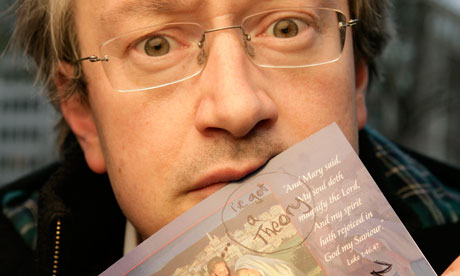Welcome to DU!
The truly grassroots left-of-center political community where regular people, not algorithms, drive the discussions and set the standards.
Join the community:
Create a free account
Support DU (and get rid of ads!):
Become a Star Member
Latest Breaking News
General Discussion
The DU Lounge
All Forums
Issue Forums
Culture Forums
Alliance Forums
Region Forums
Support Forums
Help & Search
How comedy audiences learned to laugh with science, rather than at it
http://www.guardian.co.uk/commentisfree/2011/dec/30/philip-ball-science-jokes-comedy
Bad science, fundamentalists and quacks are all comic fodder for Robin Ince. Photograph: Richard Saker
s there something funny about science? Audiences at Robin Ince's seasonal slice of rationalist revelry, Nine Carols and Songs for Godless People, seemed to think so. This annual event, at the Bloomsbury Theatre in London, is far more a celebration of the wonders of science than an exercise in atheistic God-baiting. In fact, God gets a rather easy ride: the bad science of tabloids, fundamentalists, quacks and climate-change sceptics provides richer comic fodder.
Time was when London theatre audiences preferred to laugh at science rather than with it, most famously with Thomas Shadwell's satire on the Royal Society, The Virtuoso, in 1676. Samuel Butler and Jonathan Swift followed suit in showering the Enlightenment rationalists with ridicule. In modern times, scientists (usually mad) remained the butt of such jokes as came their way.
They haven't helped matters with a formerly rather feeble line in laughs. Even now there are popularizing scientists who imagine another repetition of the 'joke' about the physicist who claims to have solved a dairy farmer's milk-production problem (his theory only works for spherical cows) will prove them all to be jolly japers. And while allowing that much humour lies in the delivery, there are scant laughs still to be wrung from formulaic juxtapositions of the exotic with the mundane ("imagine looking for the yoghurt in an eleven-dimensional supermarket!"
Meanwhile, science has its in-jokes, just like any other profession. A typical example: A neutron goes into a bar and orders a drink. "How much?", he asks the bartender, who replies: "For you, no charge". Occasionally the humour is so rarefied that its solipsism becomes part of the joke. Thomas Pynchon, for instance, provides a rare example of an equation gag, which I risk straining the Guardian's typography to repeat: ∫ 1/cabin d(cabin) = log cabin + c = houseboat. This was the only calculus joke I'd ever seen until Matt Parker produced a better one at Nine Carols. Speaking of rates of flow (OK, it was flow of poo, d(poo)/dt – some things never fail), he admitted that this part of his material was a little derivative.
InfoView thread info, including edit history
TrashPut this thread in your Trash Can (My DU » Trash Can)
BookmarkAdd this thread to your Bookmarks (My DU » Bookmarks)
3 replies, 1258 views
ShareGet links to this post and/or share on social media
AlertAlert this post for a rule violation
PowersThere are no powers you can use on this post
EditCannot edit other people's posts
ReplyReply to this post
EditCannot edit other people's posts
Rec (3)
ReplyReply to this post
3 replies
 = new reply since forum marked as read
Highlight:
NoneDon't highlight anything
5 newestHighlight 5 most recent replies
= new reply since forum marked as read
Highlight:
NoneDon't highlight anything
5 newestHighlight 5 most recent replies
How comedy audiences learned to laugh with science, rather than at it (Original Post)
xchrom
Jan 2012
OP
As I told the BF a couple days ago, there are only 10 kinds of people in the world
Tansy_Gold
Jan 2012
#1
Tansy_Gold
(17,847 posts)1. As I told the BF a couple days ago, there are only 10 kinds of people in the world
Those who understand binary, and those who don't.
xchrom
(108,903 posts)2. count me in the 'don't' crew -- i'm just fakin it til i make it. nt
SixthSense
(829 posts)3. Then there's the programmer who shampooed himself to death
he was just following the instructions on the bottle: Rinse, lather, repeat.